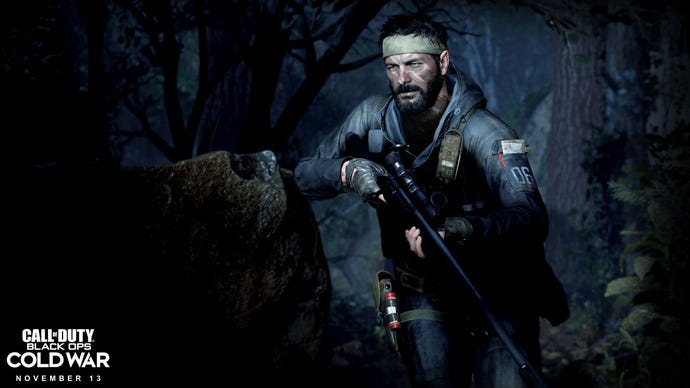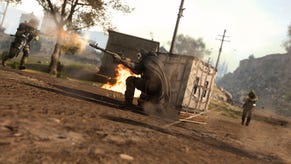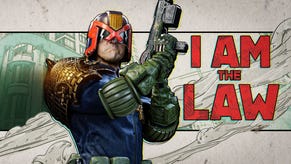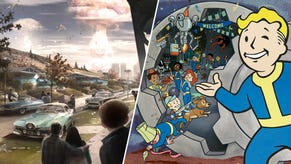Even free from all its beta troubles, Black Ops Cold War is competing with a once-in-a-decade phenomenon
Black Ops Cold War is fighting an uphill battle against a Call of Duty game that didn’t quite play by the same rules.
The state of the Call of Duty: Black Ops Cold War beta really should worry everyone, not just Activision. Even when it’s not stuttering or glitching, its weapon balance and movement mechanics are archaic. Its Netcode is serviceable at best, questionable at worst, and its presentation in everything from visuals, animation, sound design feels like a major step back.
Some of these problems will be cleaned up by launch, no question. Even then, Black Ops Cold War could not topple last year’s Call of Duty, no matter how hard it tries. For better or worse, Modern Warfare is Black Ops Cold War’s biggest problem. At its core, Black Ops Cold War is interested only in being another Black Ops game. Many of the complaints I have with it won’t even register with a core community that prefers Treyarch’s entries.
The sublime weapon animations of Modern Warfare are seen as an unnecessary complication that takes away from the series’ arcade nature. Its fluid, weighty movement is slow and cumbersome to the bunny-hopping, slide-addicted twitchy players. Even the standard-setting weapon acoustics and audio design were considered a negative for making it harder to detect footstep sounds.
By design, none of that is in Black Ops Cold War. In theory, there’s nothing inherently wrong with this approach. The Modern Warfare crowd gets a game that caters to their needs every two or three years, and the Black Ops hardcore likewise have to wait their turn. But all of that would have played better if Modern Warfare was, well, just another modern military shooter by a studio whose last two entries alienated the core Call of Duty community. Except, of course, it was anything but.
I’d like to think that a good way of judging how affecting a game was is to look at how non-followers of its franchise perceive it. Modern Warfare didn’t just advance the engine tech, quality and expectations for Call of Duty, it did so at a level that made it hard to ignore by millions who would have otherwise dismissed it.
Look at the most popular Battlefield channels today, for instance. The ones who haven’t pivoted to covering more than just DICE’s series have found a new, permanent home in Call of Duty. It helps, of course, that Battlefield has been in a sorry state for a while now, but I find it hard to believe that all of those content creators, who never played Call of Duty before, somehow hate playing Modern Warfare and only do it for the traffic.
The reception of the Battlefield YouTube creator community is reflective of Modern Warfare’s general perception by players of the same series, and the wider shooter community who never really took Call of Duty seriously. I distinctly remember repeatedly getting surprised to see names of friends I had made playing the Call of Duty 4 pop up on my list alongside the ‘playing Modern Warfare’ tag. I know for a fact those people barely kept up with the series since then.
Even friends whom I don’t traditionally think of as shooter fans were sold after watching some gameplay videos, and many more joined when the word of mouth did the heavy lifting in the first few weeks. For something to make such an impression, Modern Warfare had to be exceptional. It needed to re-create the – heretofore thought impossible – success of the original game that it borrows its name from.
Then came Warzone, which, again, could have simply been another Blackout-like mode that attracts a few curious outsiders in its first month before they all leave it for the ultra-hardcore. But Warzone changed the battle royale game, let alone the outside perception of Activision’s yearly approach to content. It went from strength to strength, to the point that it forced the publisher to re-center Call of Duty around it, to say nothing of its effect on how its future games are now being revealed.
We could argue for hours about Infinity Ward’s approach to everything from design, to balance and communication, but no one can deny how enraptured everyone was with Modern Warfare and Warzone. It’s October now, and you can easily find plenty of outlets covering patches for both games as if they had just been released. I have not seen that before with any Call of Duty game over the past six years. Interest in the yearly game usually fades by February or March.
This isn’t me dunking on Treyarch for reportedly having to crunch to salvage a broken game, or giving Infinity War undue praise. I have my own problems with Modern Warfare’s often confused design. But we can only look at the circumstances. Was Infinity Ward lucky to have key members of its original founding return after a stint at Respawn, elevating its own design leagues beyond what many thought possible? Potentially, but things could have just as easily gone a different way.
By the same token, was Treyarch always set up for failure on Black Ops Cold War (given everything we know)? Could be, but this could have also been Black Ops 5, a game that pushes the franchise forward in every way.
There are hints of innovation and risk-taking within Black Ops Cold War. The Fireteam mode is a good attempt at allowing large-scale, combined arms combat to make sense in a Call of Duty game outside of BR. Its engine does look markedly better than Black Ops 4’s, and it really shows in these large-scale modes.
But compare that to Warzone and it feels quaint. I still don’t quite understand how Modern Warfare’s engine could do what it does at that level of fidelity, particularly now that I can see Black Ops’ tech struggling to impress at the same scale.
I almost feel bad for Black Ops Cold War. It’s a game doomed to fail - not commercially, mind you, but in dominating the zeitgeist like the good Call of Duty games have. Its reported development troubles are well reflected in its shocking technical state, beta or not - there's only so much you can forgive in a beta for a game releasing in under a month. Its design, however, makes it a day late and a dollar short.
















